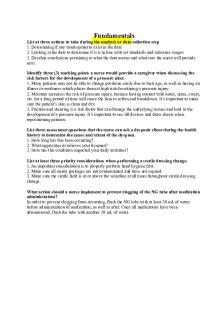Pharmacology Post Assignment PDF

| Title | Pharmacology Post Assignment |
|---|---|
| Course | Professional Career Development Seminar |
| Institution | Florida Agricultural and Mechanical University |
| Pages | 2 |
| File Size | 64.3 KB |
| File Type | |
| Total Downloads | 22 |
| Total Views | 137 |
Summary
Download Pharmacology Post Assignment PDF
Description
A neutropenic patient is receiving filgrastim. What are three nursing considerations for this medication? 1. It’s important to monitor vital signs. This drug has been known to cause abnormal ST-segment depression. 2. Remember to monitor for signs and symptoms of infection and limit client’s exposure to pathogenic microorganisms. Clients are more susceptible to infection until an acceptable WBC count is achieved. 3. Monitor client’s CBC w/ differential until WBC count is at an acceptable level. Anticholinergic medications are used to treat extrapyramidal symptoms. What is the expected pharmacological action? Anticholinergic medications are competitive antagonists of the neurotransmitter acetylcholine. Anticholinergic medications block acetylcholine from causing involuntary movement of the muscles seen in the GI tract, urinary tract, as well as the lungs. A client is prescribed a protease inhibitor—ritonavir. Identify three nursing considerations when administering a protease inhibitor. 1. Assess patient for rash, which usually occurs in the second week of therapy. 2. Important to monitor viral load and CD4 counts regularly during this medication therapy. 3. Monitor blood glucose level; medication may cause hyperglycemia. Also monitor for new onset of diabetes mellitus or exacerbation of diabetes mellitus. What class of medication is amitriptyline and why is this medication used as an adjuvant medication for pain? Amitriptyline belongs to the class of medications called tricyclic antidepressants (TCAs). It is used as an adjuvant for pain medication because it lowers pain signals sent to the brain and it’s indicated to use for chronic pain syndromes, such as fibromyalgia, neuropathic pain/chronic pain, low back pain, etc. A nurse is caring for a client who has a new prescription for raloxifene. What are contraindications for this medication that the nurse should discuss with the client? This medication is contraindicated with a history of thromboembolic events, malignancy, active smoking, or any thrombophilia. It must be used cautiously in persons with atrial fibrillation and hypertension. A nurse has provided education to a client who has a new prescription for brimonidine ophthalmic drops. Which statements by the client would indicate they understand the instructions? I will use the number of drops my doctor prescribed for me. I will wash my hands before using the eye drops. I will not touch the tip of the eye dropper or place it directly on my eye. I will make sure not to use the eye drops if it looks cloudy or has changed colors.
A nurse is administering vancomycin to a client who develops an infusion reaction sometimes referred to as red man syndrome. What action by the nurse could have prevented this reaction? The nurse could have infused the medication slowly over 1 hour. Infusing the medication quickly will increase the risk for developing red many syndrome. A client has been prescribed oxybutynin for treatment of overactive bladder and has been experiencing anticholinergic effects. List two actions the client will take to prevent adverse reactions of this medication therapy. 1. To relieve dry mouth suck on sugarless hard candy and have good oral hygiene. 2. Increase the fiber in the diet and drink water to reduce the chance of developing constipation. A nurse is caring for a client who has a new prescription for alosetron. What are the expected therapeutic effects for this medication? The expected therapeutic effects include slowing the movement of stool through the intestines, which makes it suitable to use in episodes of diarrhea, pain, cramps, and the feeling of having the urgent need to empty your bowels. A nurse is caring for a client who has refused his morning medications. How should the nurse respond to the client? The nurse should first find out the reason the patient does not want to take his medication. The nurse should then find out if the patient understands why he is prescribed this medication, and if need be, educate the client on the use of his medication....
Similar Free PDFs

Pharmacology Post Assignment
- 2 Pages

Pharmacology Assignment
- 2 Pages

Med Surg Post Assignment
- 2 Pages

Mental Health Post Assignment
- 2 Pages

Maternal Newborn Post Assignment
- 2 Pages

Post Lab Assignment B
- 6 Pages

Fundamentals Post Assignment
- 1 Pages

Lab 5 Post-Lab Assignment
- 3 Pages

Post - Lecture Assignment 2:27
- 2 Pages
![[LR]Prep-5 Post-lab Assignment](https://pdfedu.com/img/crop/172x258/oz3lq5vpjyrw.jpg)
[LR]Prep-5 Post-lab Assignment
- 3 Pages
Popular Institutions
- Tinajero National High School - Annex
- Politeknik Caltex Riau
- Yokohama City University
- SGT University
- University of Al-Qadisiyah
- Divine Word College of Vigan
- Techniek College Rotterdam
- Universidade de Santiago
- Universiti Teknologi MARA Cawangan Johor Kampus Pasir Gudang
- Poltekkes Kemenkes Yogyakarta
- Baguio City National High School
- Colegio san marcos
- preparatoria uno
- Centro de Bachillerato Tecnológico Industrial y de Servicios No. 107
- Dalian Maritime University
- Quang Trung Secondary School
- Colegio Tecnológico en Informática
- Corporación Regional de Educación Superior
- Grupo CEDVA
- Dar Al Uloom University
- Centro de Estudios Preuniversitarios de la Universidad Nacional de Ingeniería
- 上智大学
- Aakash International School, Nuna Majara
- San Felipe Neri Catholic School
- Kang Chiao International School - New Taipei City
- Misamis Occidental National High School
- Institución Educativa Escuela Normal Juan Ladrilleros
- Kolehiyo ng Pantukan
- Batanes State College
- Instituto Continental
- Sekolah Menengah Kejuruan Kesehatan Kaltara (Tarakan)
- Colegio de La Inmaculada Concepcion - Cebu





